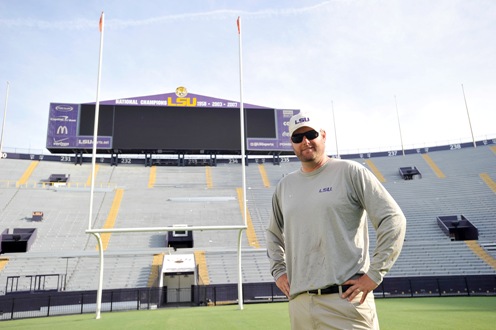SportsTurf: It is a long way from the Schaumburg Flyers to the LSU Tigers; what wisdom can you share with younger turf managers about being successful in the profession?
Fasbender: Be active within the industry. Volunteer your time, serve on committees, share your ideas and don’t be afraid to fail.
SportsTurf: You know a lot of sports turf managers. What are they saying are the biggest obstacles to overcome for them to be successful today?
Fasbender: I think many of the challenges we face are environmental factors. Water restrictions, pesticide restrictions or bans, and an increased expectation with water quality. All of these are things are challenges we face now and we will continue to face in the future if we do not adapt and try new products and practices.
SportsTurf: What are your biggest challenges working in the high-profile Southeastern Conference?
Fasbender: Our biggest challenge at LSU is the expectations of having everything game ready 365 days a year. Our athletic fields are the easier part of that component. Meeting the expectations with our facility landscapes and hardscapes has proven to be more challenging. The other big challenge that we deal with is retaining staff. We have had a lot of talented individuals come to LSU Athletics and have made a real impact. They have shown that they can grow and learn new things and have helped to raise the bar. The problem with hiring talented people is that they move on when opportunities present themselves and I can’t fault them for that. It’s just something we have to contend with once in awhile.
SportsTurf: How has social media impacted your work?
Fasbender: I will say this. It has become a blessing and a curse. If used properly, social media has given sports turf managers a vessel to show off our work and educate the public about our profession. In the past, we were in situations where we only made headlines when things went wrong. Now we have the means to put ourselves and what we do in front of the community when things are going well.
I feel the downside of social media is that our surfaces and facilities need to be perfect or close to perfect year round. You never know when someone is going to take photos and post them on a chat board without knowing the circumstances surrounding your maintenance schedule. I am thankful for the media training I have received over the years. It has really helped with understanding and managing this issue.
SportsTurf: What’s your favorite on-field maintenance task that you still enjoy performing?
Fasbender: When given the chance, I still love getting on an infield drag and picking up a 1-inch braided hose. That is where I got my start in this industry and it takes me back to learning the techniques at the University of Tennessee with Bobby Campbell. I think one of the things that I like the most about infield skin maintenance is that, like most things in this industry, it’s a science and an art. For the most part, that is like our signature as sports turf managers. You can tell a lot about a person by the way they prepare and work with clay.
SportsTurf: How do you think the profession and industry will change in the next 10 years?
Fasbender: One word: technology. Look at all the advancements that have been made in the past 10 years and think about what the future holds. Equipment automation, evolution of hybrid fields, and improved turfgrass varieties are just a few of the things we can look for in the next decade.
SportsTurf: How do you think the natural turf vs. synthetic turf issue will play out over the next decade?
Fasbender: I am a great believer in history repeating itself and looking to the past to predict future trends. I think these two surfaces will ebb and flow with popularity. When synthetic surfaces first came out you saw a huge increase of artificial fields in the 70s and 80s. As techniques were refined and improved for the maintenance of natural surfaces, you saw a swing away from synthetic. In the early 2000s, with the advent of infill synthetic systems, we saw a swing back toward the synthetic side. I think that most players when surveyed prefer to play on grass and I believe that the industry has started to swing back that way again. One thing is for sure, synthetic turf is here to stay. As much as I love working on natural grass, I am very thankful for the synthetic surfaces we have at LSU. They are a useful tool that can be used in the right application.
SportsTurf: What are your passions and interests outside of work?
Fasbender: My family is what drives me in my life. My wife, Liz, and I have been married for 14 years and we both know how to work around our crazy schedules. She coaches varsity soccer for the high school where she works so things can be hectic in the late fall and winter. My daughter, Peyton, is six and is interested in gymnastics and dance and has shown an interest in hunting. She loves being outdoors so it seems, for now; she will be coming along on more trips with me. My son, Parker, is three and loves anything that has wheels or tracks attached to it. He has acquired a vast empire of full-sized Tonka trucks and equipment and loves digging holes in our back yard. Whenever I have some free time, away from family obligations, I am headed to the woods. Deer and turkey hunting has really become a passion of mine in the past few years and I love sharing that with my family.


